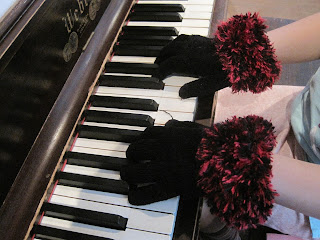Why Parents Should Sit In on Piano Lessons
Back in my MYC days, Mom was always sitting in on my piano lesson. All the parents in my group, and every other group, did. It was a requirement of the course. I didn't realize how much that was to my advantage, but I was perfectly OK with having Mom around during lessons. It was a comforting thing. This was also to both of our advantages: Mom knew what was going on during lessons, so during the week, she had a better idea of what my practice should sound like.
As a teen, Mom would drop me off and go shopping during my hour-long lesson... until I switched to a teacher who did not write neat, tidy practice directions for me. His notes to me consisted of "Sonata in E Flat" or "Rhapsody" scrawled in huge letters across the page. However, his lessons were amazing, and as his studio was large, Mom would often sit and listen. One day she started taking notes for me. Everyone was happy. My teacher was pleased to see Mom's involvement, and I finally got specific, detailed notes on each piece, which helped improve my practice, which... made Mom happy. :)
Now, as a teacher, I see a trend: Parents don't often sit in during their kids' lessons. While this trend is in perfect accord with our culture, I want you to know that I encourage parents to stay in the studio and listen in on their children's lessons. Want to know why?
- So you can know what your child is supposed to be doing for practice. Not like the mom I once read about who diligently clocked her sons' practice times... and never realized that they were playing audio-cassette recordings of their practice and thus slipping out of actually practicing!
- So that, when your child needs help, you know how to help them. You might not know how to read music yourself. But when you sit in on your child's lesson, you do pick up -- enough to help them when they can't remember what note they're supposed to start on, or how to clap and count the rhythm of their song.
- Behaviour. :) This one's a fairly minor reason, but still valid enough to put down here, especially if there's a specific behavioural pattern you're trying to work on in your child. E.g. maybe you want your child to improve on their listening skills (and I'm not talking about identifying intervals here!). If it's just me and them, I might not know that you are trying to work on getting them to listen the first time around. After all, most of my students need to be told things twice, sometimes three or four times. If you're there, however, you can remind them in the areas you know to be their weaknesses.
- This one's specific to online lessons: Tech troubles. Hey, it happens! In this case, because you're at home, you don't have to be over your child's shoulder. You just have to be close enough that, if the connection fails, your computer starts acting weird, or the audio is choppy, you can intervene and we don't have to lose a lot of minutes because of faulty technology.




Comments
Post a Comment